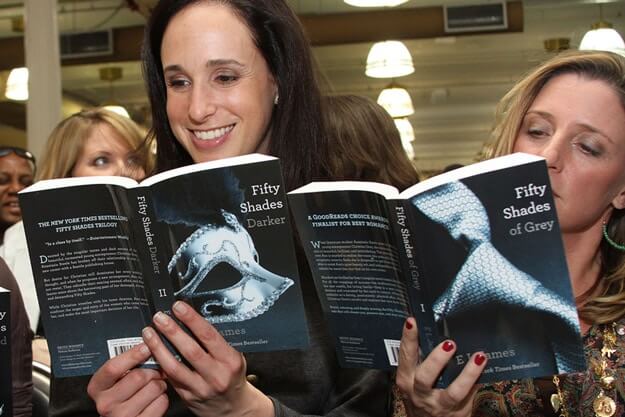
This summer’s beaches and swimming pool chaises have been smoldering under the popularity of the BDSM title, Fifty Shades of Grey, so much so that the once self-published erotica novel and its two sequels have even developed their own internet meme. But what has the impact of such a title had on both the erotica genre and digital publishing?
Initially, E.L. James self-published Fifty Shades, but the success of its initial sales led to a traditional publishing deal from Viking, an imprint of Random House. That brought with it an extensive amount of publicity, regardless of the book’s subject matter. The indie author community, while not always a fan of the content or of the author’s writing style, did have cause to celebrate its success and acceptance.
“My belief is it’s good for erotica as it portrays a public that appears more accepting of sex in mainstream writing,” said erotica writer Eden Baylee, whose title Fall Into Winter has been featured as the GoodeReader eBook of the Week and whose sequel, Spring Into Summer, is available now. “I say this even though erotica has existed since ancient times – the Kama Sutra being an early example. No doubt, it’s taken us a long time to get here. Ultimately, whether you like E.L. James’ books or not is irrelevant. What she’s managed to do is ignite a fire of enthusiasm for erotica. Many conversations on the topic have shone a light on other erotica writers and their books. This can only help the genre in the long run.”
Despite critics who have spewed vehemently against the practicality of the story line in Fifty Shades—such as the apparent mental illness and childhood sexual abuse of the male protagonist and the inexplicable naively virginal female lead—there are still reasons to see the title as a success for both its genre and ebooks as a whole.
“A huge problem for erotica authors is self-promotion,” commented D.C. McMillen, author of the erotica title The Rusty Nail. “Not only do we lack the large budgets of mainstream publishing houses, we also lack the typical word of mouth advertising that authors and books in other genres can count on. That’s why a surge of excitement coursed through me when I realized just how big of a success Fifty Shades of Grey had become, especially considering its origins as an indie published work. I know I’m not the only indie erotica author to get excited. There is still a collective hope among many of us that Fifty will help push other erotica works into the mainstream. After all, if women are comfortable reading that particular trilogy on the subway and airplanes, discussing it in office break rooms and on national television then there is a good chance they will do the same for other erotica books.”
One thing that James’ work arguably did for the genre was to encourage an open appreciation for the writing and the story lines. While critics may poke fun at the sexual nature of the book while likening the content to nothing more than pornography, the simple truth is readers can, for the most part, openly and unashamedly purchase and read it.
“I suppose if a self-published erotica author has dreams of being picked up by a major publisher, then this is a big win,” continued Baylee. “Setting this aside, however, I think we still need to look at the cultural reality, which is, we live in a deeply sex-phobic world. The success of E.L. James’ books does not mean ‘all erotica’ is now accepted for mainstream consumption. We have not suddenly become sexually emancipated.”
Mercy Pilkington is a Senior Editor for Good e-Reader. She is also the CEO and founder of a hybrid publishing and consulting company.